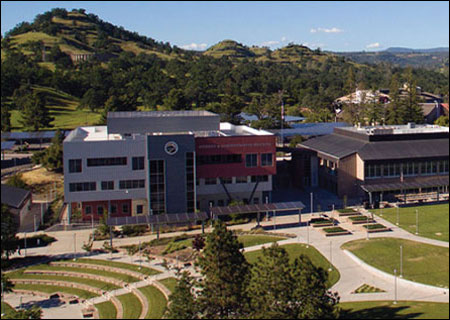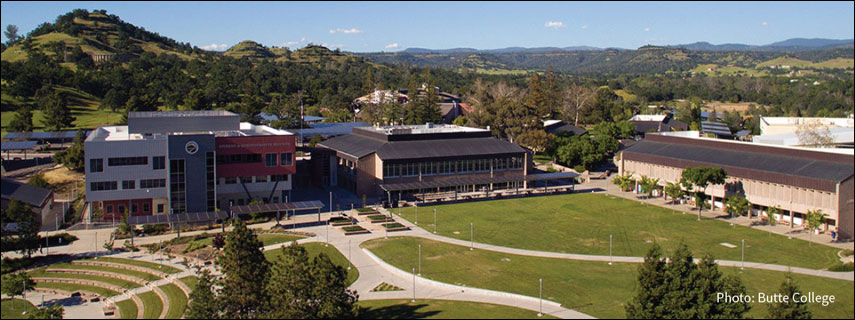- Details
- Written by Crista Souza
- Category: Uncategorised
- Hits: 159
Systemwide Technology Innovation
 For more than 25 years, the CCC Technology Center has been dedicated to transformative innovation in support of the students and staff of the California Community Colleges in collaboration with the CCC Chancellor’s Office.
For more than 25 years, the CCC Technology Center has been dedicated to transformative innovation in support of the students and staff of the California Community Colleges in collaboration with the CCC Chancellor’s Office.
Housed at Butte-Glenn Community College District, the Technology Center is currently funded through grants awarded by the CCC Chancellor’s Office Digital Innovation and Infrastructure Division. These programs are funded by the California Department of Finance for the centralized statewide technology projects of the CCC Chancellor’s Office.
Technology Center products and services are developed with full support from the Chancellor’s Office — and provided at no cost to colleges — to benefit our students, staff, and faculty to ensure student success.
Primary Workstreams
- Custom Software Development
- Centralized Services and Implementation Support
- Project and Vendor Management
For support with an existing tool or service, or to get started with a new implementation, reach out to the Enabling Services and Support team via the College Experience Managers (CEMs): This email address is being protected from spambots. You need JavaScript enabled to view it..
Products and Services Offered through the CCC Technology Center
Custom Software Development
- Student Success Suite (SSS)
- OpenCCC / CCCID Systemwide User Account
- CCCApply Standard Application
- CCCApply Noncredit Application
- CCCApply California Promise Grant
- CCCApply International Application
- CCC MyPath
- Career Coach
- Multiple Measures Placement Service (MMPS)
- Chancellor’s Office Curriculum Inventory (COCI)
- Course Identification Numbering System (C-ID)
- SuperGlue College Adaptor
-
- CCCApply Staging Table
- Bi-Directional Fraud Reporting
- SSO Proxy
- CCCProxy with Canvas
- Data Warehouse
-
- Canvas Data
- Direct Connect
- Report Server
- Fraud Reporting
Centralized Services and Implementation Support
- Enabling Services and Support (includes student HelpDesk services)
- Accessibility Services
-
- Canvas Instructor Accessibility Guide (Pope Tech)
- Equidox PDF Remediation
- Policy Guidance
- Pope Tech Web Accessibility Scanning Tool
- CCC Document Conversion
- Shire Captioning Editor
- Information Security Services
-
- Nessus Agents for Vulnerability Scanning
- Shibboleth IdP
- Splunk Logging
- SSL Certificates
- Tenable Vulnerability Management
Project and Vendor Management
- eTranscript California
- InCommon Federation
- Shibboleth IdP
- Listserv Management
- Library Database Subscription Services (EBSCO)
- CENIC Broadband Access
-
- Router Orders, Installation Coordination
- Central Purchasing Support
For more information visit the CCC Technology Center website at ccctechcenter.org or reach out directly to your College Experience Manager via This email address is being protected from spambots. You need JavaScript enabled to view it..
Engaging Stakeholders Statewide
The products and services offered by the Technology Center are the result of collaboration with college practitioners statewide. They provide comprehensive support to colleges and districts intended to strengthen the institution as a whole and support student success.
If you are a stakeholder in any of these broad categories, we have services designed to support you:
- IT
- Administration
- Student Services
- Curriculum & Instruction
- Research & Planning (IR)
- Admissions & Records
- Librarians
- Public Information Officers
- Procurement Officers
- Accessibility Services (504 and 508 compliance)
To learn more, send a query to the This email address is being protected from spambots. You need JavaScript enabled to view it. and a College Experience Manager will
contact you.
Support Services Provided by the Technology Center
- Implementation planning and support
- Best practice recommendations from the field
- Project management support
- End-user training and support for college staff and students
- Post implementation training through webinars, office hour sessions as well as 1:1 training
- Analysis of usage data and recommendations for improved outcomes
- End-user support through our help desk services
To access support services for products of the Technology Center visit the ccctechnology.info staff support site, ccchelp.info student help desk, or reach out directly to your College Experience Manager via This email address is being protected from spambots. You need JavaScript enabled to view it..
- Details
- Written by Crista Souza
- Category: Uncategorised
- Hits: 955
Tech Center at CISOA 2025 Technology Summit
Join Us March 3-6 in Burlingame
 Since 2001, the Chief Information Systems Officers Association of the California Community Colleges (CISOA) has supported the CCC technology community through advocacy, collaboration and professional development. The annual Technology Summit provides the best opportunity for the Technology Center to meet face-to-face with our primary audience from community colleges and districts and to showcase systemwide technology developments.
Since 2001, the Chief Information Systems Officers Association of the California Community Colleges (CISOA) has supported the CCC technology community through advocacy, collaboration and professional development. The annual Technology Summit provides the best opportunity for the Technology Center to meet face-to-face with our primary audience from community colleges and districts and to showcase systemwide technology developments.
As you plan your conference schedule, we want to make sure you know about all the sessions the Tech Center team will be presenting.
Tuesday, March 4
- 10:30 - 11:30: Busting Spam and Breaking the Bots (Jane Linder, Julia Arreguy)
- 1:30 - 2:30: CCC Technology Center and CENIC: Connectivity, Security, and AI (Cindy McCartney, CENIC’s Timothy Chia and Ken Roberts)
- 1:30 - 2:30 Americans with Disabilities Act (ADA) Title II Updates and How They Apply to Technology in Higher Education (Dawn Okinaka, Alex Marositz)
- 3:30 - 4:30: What is the CCC Tech Center up to These Days? (Jennifer Coleman)
Wednesday, March 5
- 1:45 - 2:45: The New Dual Enrollment Application: Fastest Application in the West! (Julia Arreguy, Jane Linder, Brian Schroeder)
- 4:15 - 5:15: No Way to Fake It: Validating Real-World Accessibility Conformance Using Live Product Accessibility Demos (Dawn Okinaka, Tom Siechert)
- 4:15 - 5:15: Connecting Colleges to Data: CCC Data Warehouse Upgrades and Updates (Mark Cohen)
Thursday, March 6
- 9:00 - 10:00: How Accessibility Brings Colleges in Line with the Systemwide Vision 2030 (CCC Accessibility Center joint presentation with Ventura County CCD and College of the Siskiyous)
- 10:15 - 11:15: Top Notch Security Software at No Cost to Your District (Julia Arreguy)
Please attend our sessions if you can. And be sure to stop by our booth to learn more about the products and services the Technology Center offers at no charge to California community colleges and districts.
We hope to see you at CISOA!
- Details
- Written by Crista Souza
- Category: Uncategorised
- Hits: 418
RFP #CCCTC-24-02 California Community Colleges New eTranscript California System
Timeline
| Event | Time (Pacific Time Zone) | Date |
|---|---|---|
| Proposal Deadline | 5:00 PM | 02/18/2025 |
| Review Committee Evaluations | 02/24/25 - 03/24/25 | |
| Vendor Finalists Selected | 03/25/25 - 03/31/25 | |
| Vendor Demonstrations | 04/15/25 - 04/16/25 | |
| Notice of Intent to Award Contract | 04/21/25 | |
| Contract Negotiations | 04/22/25 - 05/22/25 (projected) | |
| Contract Signature Deadline | June 2025 (projected) |
- Details
- Written by Crista Souza
- Category: Uncategorised
- Hits: 657
REQUEST FOR INFORMATION NOTICE
Notice is hereby given that the Butte-Glenn Community College District is soliciting information from respondents providing services in accordance with the applicable specifications:
Request for Information #CCCTC-24-51 California Community Colleges Fraud Mitigation Solutions
(Document available for download here.)
Purpose of the RFI
The California Community Colleges Technology Center (CCC Tech Center) at Butte-Glenn Community College District (BGCCD) as an agent of the California Community Colleges Chancellor's Office (Chancellor’s Office) is issuing this Request for Information (RFI) to gather input and obtain information related to fraud mitigation tools, data models, and processes.
Request for Information #CCCTC-24-51 California Community Colleges Fraud Mitigation Solutions seeks detailed information from respondents regarding solutions and technologies available for fraud mitigation, including enhanced fraud identification, detection, mitigation, prevention, and response capabilities. This RFI is intended to gather information to better understand the constantly shifting landscape of fraud mitigation solutions, associated costs, and implementation processes.
Such a system would be utilized within the student application and financial aid processes to minimize the volume of fraudulent activity experienced within the 116 California community colleges.
All information should be submitted in the format stipulated in this RFI via this interest form.
This RFI is not an offer to buy, nor obligation to purchase, nor an endorsement on any solutions on the part of the California Community College Chancellor's Office, the CCC Tech Center, or any individual community college.
Results will not and must not be published or shared, but will be used internally for future consideration. Interested parties may obtain further information or clarification by sending an email to This email address is being protected from spambots. You need JavaScript enabled to view it..
- Details
- Written by Crista Souza
- Category: Uncategorised
- Hits: 1399
RFP #CCCTC-24-01 New Student Application System
Timeline
Please note that the original dates for "Vendor Finalists Selected" and "Vendor Demonstrations" have been extended. More information about this update can be found in the CCCTC-24-01 Schedule of Events Amendment.
|
Event |
Time |
Date |
|---|---|---|
| Proposal Deadline | 5:00 PM | 12/11/2024 |
| Review Committee Evaluations | 12/11/2024 - 1/22/2025 | |
| Vendor Finalists Selected | 2/10/2025 - 2/12/2025 | |
| Vendor Demonstrations | 2/26/2025 - 2/28/2025 | |
| Notice of Intent to Award Contract | TBD | |
| Contract Negotiations | TBD | |
| Contract Signature Deadlines | TBD |
Tech Center Highlights
We bring systemwide enabling technologies to our colleges.
Adopt Our Tech
From connectivity to student services and educational technology.
Connecting Colleges
Gigabit fiber optic network for all of our colleges.
Information Security
Logging, monitoring, and no-cost tools to protect students and educators.
Accessibility
Training and resources to make tech accessible to users with disabilities.
Events
Upcoming CCC Technology Center workshops and webinars.
About the Technology Center
The California Community Colleges Technology Center, hosted by Butte College, facilitates and coordinates the work of systemwide technology. Our 25-year history of collaboration with the Chancellor’s Office and community colleges throughout the state has resulted in great strides forward for the system in areas including federated identity, application architecture, networking, and student services.
We operate under the Gartner model of “Run, Grow, Transform” to simplify our portfolio of services and prioritize resources in support of ongoing operations, the next phase of growth, and longer term transformative innovation.







